The first two presidential debates focused much on the war in Iraq, national security, and the fight against terrorism. With such issues at the forefront of much of this campaign, just how do American veterans feel about the race for the White House this election year? According to Gallup polling this year, veterans are generally more likely to support George W. Bush than John Kerry, and a majority of veterans think the president is doing a good job. Veterans also feel that Bush would do a better job than Kerry would of handling the war in Iraq and terrorism, but are currently divided as to who would better handle the economy.
To examine the attitudes of veterans more closely, Gallup combined the results of nine surveys* conducted at four different points in time: two surveys taken in the spring (March and May); two surveys conducted in late July and August after the Democratic convention and before the Republicans' convention; two polls following the Republican convention in September; and the three most recent surveys from October. Taken together, these surveys contained 1,512 people who identified themselves as veterans who are registered to vote in this year's election.
Overall, the combined nine surveys show that 18% of Americans can be classified as veterans -- people who personally served in the military at some point in their lives -- and 6 in 10 respondents (60%) have never served and do not live with anyone who has served in the military.
Registered veterans are more likely to identify themselves as Republicans than as independents or Democrats. Veterans are much more likely to be men than women, and few younger Americans say they have served in the military. There is also a slight tendency for veterans to live in the South (as is the case with the overall population of registered voters).
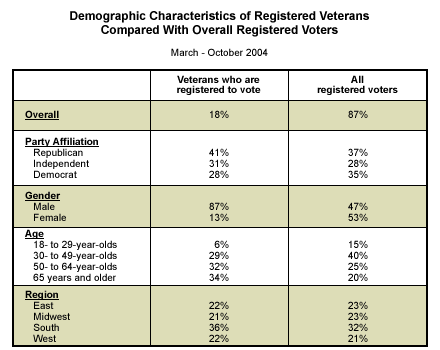
The Vote for President
Consistent with the fact that most veterans are male and that they are significantly more likely to be Republicans than Democrats, veterans who are registered to vote in this year's presidential election support Bush over Kerry, by 54% to 41% -- again based on a combination of surveys extending from March through October. Independent candidate Ralph Nader currently receives 2% of the vote among registered veterans. Veterans have consistently shown more support for Bush than for Kerry throughout the campaign. All registered voters interviewed across these same surveys give Bush 48% of the vote, Kerry 46% and Nader 3%.
Earlier this year, Bush led Kerry by a margin of 51% to 40% among veterans. In between the two conventions this summer, the race narrowed, with 53% of veterans supporting Bush and 44% supporting Kerry. In September, 60% of registered veterans said they would vote for Bush, while 35% would vote for Kerry. Nader has averaged 3% across all four periods.
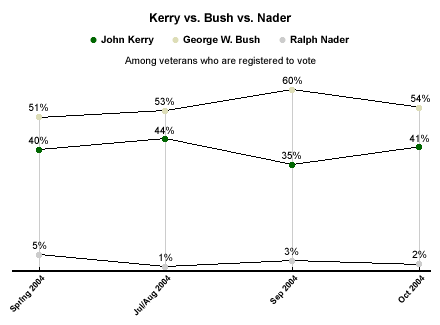
George W. Bush's Job Approval Ratings
A majority of registered veterans have approved of the way Bush is handling his job as president across the nine surveys included in this analysis, although Bush's approval ratings have dipped over the past month. The October data show that 54% of registered veterans approve of Bush, while 44% disapprove. Last month, 61% of registered veterans approved and 37% disapproved of Bush. Bush's approval ratings among registered veterans were in the mid-50% range this past spring and summer.
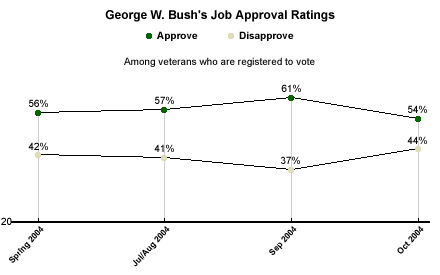
Who Would Better Handle the Issues?
Bush currently has a clear advantage over Kerry among veterans when it comes to the issues of Iraq and terrorism, but the candidates are essentially tied on the economy. Since last month, Kerry has done slightly better and Bush has done slightly worse on all three issues.
Terrorism
Of these three issues, Bush maintains the strongest lead among veterans on the issue of terrorism. Currently, 61% of registered veterans say Bush would do the better job on terrorism, while 35% say Kerry would do better. Last month, 67% preferred Bush to handle terrorism, 31% Kerry. Earlier this year, in July/August, 60% chose Bush, while 33% chose Kerry.
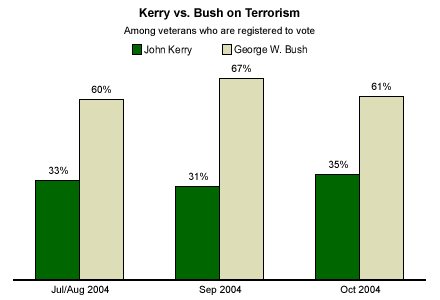
Iraq
By 57% to 40%, registered veterans currently prefer Bush rather than Kerry to handle the situation in Iraq. Earlier this year, the gap between Bush and Kerry for handling the situation in Iraq was greater. In September, nearly two-thirds of registered veterans (65%) chose Bush, while a third (32%) chose Kerry. And, last July/August, 58% said Bush would better handle Iraq, while 38% said Kerry.
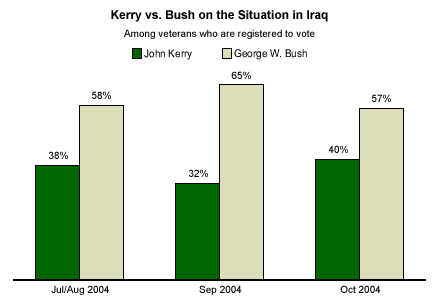
The economy
The two candidates are now essentially tied among registered veterans as to who would do a better job on the nation's economy (49% say Kerry would do the better job and 47% say Bush). Prior to the most recent polling in October, Bush had at least a slight advantage on the economy among veterans. In September, Bush led Kerry by 57% to 39%, and in July/August, Bush had a 50% to 44% lead over Kerry on the economy.
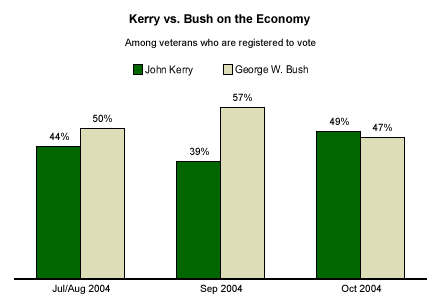
*Results are based on telephone interviews with 467 registered voters who served in the United States military, aged 18 and older, conducted Oct. 1-3; Oct. 9-10; and Oct. 14-16, 2004. For results based on the total sample, one can say with 95% confidence that the margin of sampling error is ±6 percentage points.
Results are based on telephone interviews with 339 registered voters who served in the United States military, aged 18 and older, conducted Sept. 3-5 and Sept. 24-26, 2004. For results based on the total sample, one can say with 95% confidence that the margin of sampling error is ±6 percentage points.
Results are based on telephone interviews with 375 registered voters who served in the United States military, aged 18 and older, conducted July 30-Aug. 1 and Aug. 23-25, 2004. For results based on the total sample, one can say with 95% confidence that the margin of sampling error is ±6 percentage points.
Results are based on telephone interviews with 331 registered voters who served in the United States military, aged 18 and older, conducted March 26-26 and May 7-9, 2004. For results based on the total sample, one can say with 95% confidence that the margin of sampling error is ±6 percentage points.
